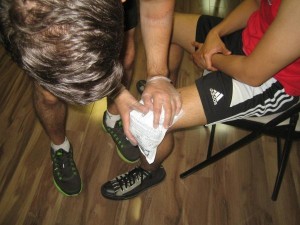Whether an individual is starting to run or already a seasoned runner, he/she has experienced knee pain or other related injured at some point in time. The knee pain can be triggered by various factors including incorrect warm-ups before running or lack of cooling down after.
Poor stretching or wrong techniques can also lead to injuries as well as overusing certain muscles or running with an incorrect form. If the individual experiences knee pain due to running, there are various techniques that must be observed to help reduce the knee pain and discomfort.
Compression
You can apply a compression wrap to provide protection to the knee. In case the pain or injury is considered severe, it is important to stabilize the joint using a cast or brace. The individual should avoid using the injured knee and allow the leg muscles to rest for at least 2 days. Remember that engaging in any form of weight bearing activities even standing can cause the knee pain to worsen.

Application of ice
It is vital to apply an ice pack or cold compress on the injury. You have to apply an ice pack over the knee for at least 15 minutes every hour during the initial day after the injury was sustained. The application of ice should be continued at least 4 times a day until there is an evident reduction in the knee pain and swelling.
Elevation
Raise the affected limb to minimize the swelling. You can also prop the knee on a cushion or pillow to allow gravity to drain the fluid away from the injury. The release of pressure can help reduce the pain.
Assistive devices
It is also recommended to utilize crutches or a knee brace to help stabilize the leg as well as medications to minimize the swelling and pain. When it comes to severe injuries that include ligament sprains or a torn anterior cruciate ligament (ACL), they require the use of crutches or brace to stabilize as well as protect the joints. It is also recommended to provide the individual with pain medications such as ibuprofen and acetaminophen to manage the pain and swelling.
Considerations to bear in mind
If the pain is persistent or severe, a doctor should be consulted so that further assessment can be carried out. A sports physician or orthopedic surgeon must be consulted if the knee pain continues or if a serious injury to the meniscus is suspected.
The ideal way to prevent knee injuries is to observe proper stretching, warm-ups as well as cooling down exercises before engaging in sports or other forms of physical activity.
